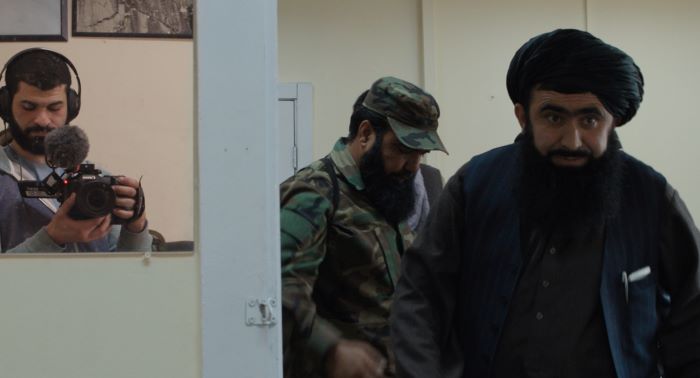![]() Films about a changing Afghanistan from the 2000s now seem like ancient history. Afghan Star (2009), The Beauty Academy of Kabul (2004), and more recently from 2018, Angels Are Made of Light, took place during the ongoing U.S. and NATO presence as the country was rebuilding after the fall of the Taliban in 2001. Now enters the new documentary Hollywoodgate, which started filming shortly after the United States left Afghanistan and the Taliban recaptured the capital, Kabul, in August 2021. Through international connections with world leaders, Berlin-based Egyptian journalist and debut filmmaker Ibrahim Nash’at was able to follow the new air force commander, Mawlawi Mansour, with the stipulation that he follow only him and other Taliban. Nash’at was armed with just his camera and a translator. When he is commanded to turn off his camera, he complies.
Films about a changing Afghanistan from the 2000s now seem like ancient history. Afghan Star (2009), The Beauty Academy of Kabul (2004), and more recently from 2018, Angels Are Made of Light, took place during the ongoing U.S. and NATO presence as the country was rebuilding after the fall of the Taliban in 2001. Now enters the new documentary Hollywoodgate, which started filming shortly after the United States left Afghanistan and the Taliban recaptured the capital, Kabul, in August 2021. Through international connections with world leaders, Berlin-based Egyptian journalist and debut filmmaker Ibrahim Nash’at was able to follow the new air force commander, Mawlawi Mansour, with the stipulation that he follow only him and other Taliban. Nash’at was armed with just his camera and a translator. When he is commanded to turn off his camera, he complies.
Even with these limitations, Nash’at has made a revelatory film of Afghanistan under Islamic military rule, now known as the Islamic Emirate of Afghanistan. At first, Mansour and his soldiers are wary of the foreigner with a camera as he and his men inspect the now abandoned Kabul air force base, Hollywood Gate. However, the leader reassures his men, “If his intentions are bad, he will die soon.”
As they roam the vast military facility, rumored to be a CIA station, Mansour and his men discover a bounty of booze, shattered computers, and other debris left from the departing Americans, along with deliberately damaged Black Hawk helicopters, B-35 bombers, and other military equipment. In time, the Taliban government begins to repair the abandoned stockpile of weaponry. The film states that, according to the Pentagon, $7.3 billion worth of military equipment was abandoned when the United States abruptly departed. Apparently, Nash’at gains the Taliban’s trust; he films during the course of an entire year.
His documentary concludes at the one-year anniversary of the fall of Kabul, which is celebrated at what used to be the U.S.’s largest miliary facility in the country, Bagram Airfield. Dignitaries from Russia (the chief of protocol of its embassy), Pakistan, and Iran attend, while a suicide bombing brigade takes part in the miliary parade.
This is an extremely rare exposé of an under-reported story, particularly the inclusion of the growing tension between Afghanistan and neighboring Tajikistan, where an insurgency has found harbor there. In the meantime, this is an opportunity for international audiences to have an inside look into the country; its current rulers won’t be pleased by this film. And somehow Nash’at briefly captures civilian life on the streets: a burqa-clad woman begging in the middle of a snowy intersection, young boys also begging, chasing after cars. In his concluding voice-over, he regrets not having access to everyday Afghans, and worries for their future. Though he takes a fly-on-the-wall approach to filmmaking, the accompanying brooding score is one way of editorializing within circumscribed means.

















Leave A Comment